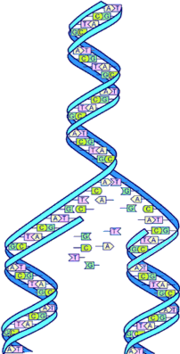Openbiology
| Open Science | ||
|---|---|---|
| Navigation | Open General Science | Open Biology | Open Chemistry | Open Physics | |
Overview
|
|
|
A free content video streamed from Vimeo David Murawsky. |
This is the homepage for OpenBiology: an on-going project to build a multimedia, interactive biology textbook for schools in New Zealand and Australia. The vision for this project is for it to harness the power of the wiki, and for it to be:
- collaborative, facilitating interactions between academics, teachers and students, and
- multimedia, employing the best of text, video, image and audio.
The best way to develop this resource is to have students build it. If you're working on a particular topic, have students build a paragraph or two in the wiki, explaining key concepts to others, then have other groups peer-review the work. The more student-owned the resource is, the more successful it will be.
Aim of the project
This project is designed to be the core textbook for students studying biology in New Zealand and Australian high schools. We know that learning happens best when it is active and constructive. As such, this resource is designed as much for students to contribute to as teachers. We also know that peer-review is one of the fundamental concepts in the study of science, and you are encouraged to review the content assembled here.
What can you do?
Regardless of whether you are a student, a teacher, an academic or an interested by-stander, you are welcome to play a role in this project. All contributions that push the project forward are welcomed. If this project interests you, please consider doing one of the following:
- Add a page, edit a page or review a page. Even if it is a modest contribution like tidying up some formatting or correcting a spelling error; everything helps.
- Record a video and upload it, or suggest a video that might add clarity to a page.
- Let others know about the project. Know any students, teachers or parents who might find it useful? Let them know.
Project Content
The project will eventually cover the key areas in the study of Biology:
- The diversity and classification of life
- Levels of organisation:
- molecules
- cells
- tissues
- organs
- organ systems
- organisms
- populations
- ecosystems
- Anatomy and Physiology
- Development
- Genetics
- molecular
- mendelian
- population
- Behaviour
- Evolution
